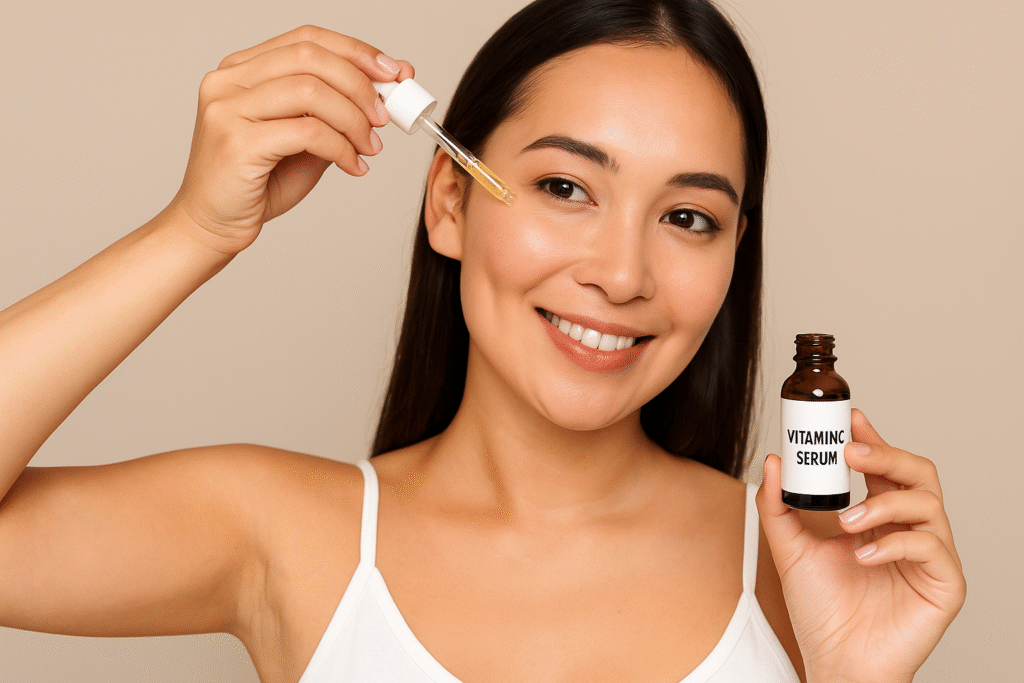Vitamin C Serum: Benefits, How to Use
Introduction
In the ever-evolving world of skincare, Vitamin C serum has claimed the spotlight — and for good reason. This powerhouse ingredient has quickly become a must-have in every beauty lover’s routine. Whether you’re battling dullness, uneven skin tone, or early signs of aging, a well-formulated Vitamin C serum could be your skincare game-changer.
In this guide, we’ll walk you through everything you need to know about Vitamin C serum — what it is, how it works, the incredible benefits it offers, how to apply it correctly, what to expect over time, and how to pick the best one for your skin type.
What Is Vitamin C Serum?
Vitamin C serum is a lightweight, fast-absorbing liquid packed with Vitamin C, a powerful antioxidant known for brightening the skin, fighting free radicals, and supporting collagen production.
🔸 Common Forms of Vitamin C in Serums:
- L-Ascorbic Acid: The most potent and fast-acting form; works best at 10–20% concentration.
- Sodium Ascorbyl Phosphate: A gentler, stable derivative suitable for sensitive skin.
- Magnesium Ascorbyl Phosphate: Hydrating and less irritating; great for dry or mature skin.
- Ascorbyl Glucoside: A stable, water-soluble form effective at brightening and anti-aging.
🔸 Concentration Matters:
- 5–10% – Mild, great for beginners or sensitive skin.
- 10–20% – Ideal for most users; balances potency with tolerance.
- Above 20% – May not yield extra benefits and could irritate the skin.
Top 7 Benefits of Vitamin C Serum
1. Brightens Dull Skin
Vitamin C boosts skin radiance by inhibiting melanin production, giving you that glow-from-within look.
2. Reduces Pigmentation and Dark Spots
It helps fade hyperpigmentation, sun spots, and post-acne marks, leading to a more even complexion.
3. Evens Out Skin Tone
Vitamin C minimizes redness and blotchiness, making your skin tone look uniform and balanced.
4. Boosts Collagen Production
By stimulating collagen synthesis, it helps reduce fine lines and promotes firmer, youthful-looking skin.
5. Protects Against Sun Damage and Pollution
As an antioxidant, Vitamin C shields your skin from free radicals caused by UV rays and environmental stressors.
6. Fades Acne Marks and Scars
It accelerates cell turnover and fades residual scarring for a clearer, smoother face.
7. Gives a Radiant Glow
With consistent use, Vitamin C transforms dull, tired skin into a healthy, dewy canvas.
How to Use Vitamin C Serum (Step-by-Step Guide)
🕐 When to Apply:
- Ideally in the morning, after cleansing and before moisturizer and sunscreen.
- Can be used at night too — especially in less sunny climates or if paired with SPF during the day.
💧 How Much to Apply:
- 2–4 drops or a pea-sized amount is enough for the whole face.
📋 Application Order:
- Cleanser
- Toner (optional)
- Vitamin C Serum
- Moisturizer
- Sunscreen (AM only)
🌞 Should It Be Used with Sunscreen?
Absolutely! Vitamin C enhances sunscreen performance and adds extra protection against UV damage.
What to Expect: Results Timeline
📅 Week 1:
Skin feels more hydrated, slightly plumper, and a bit brighter.
📅 Weeks 2–4:
Improved texture and tone; mild pigmentation and dullness begin to fade.
📅 Weeks 6–8:
Noticeable reduction in dark spots, acne marks, and early signs of aging. Skin looks smoother and more radiant.
Consistency is key! Don’t expect overnight miracles — Vitamin C works gradually.
Tips for Choosing the Right Vitamin C Serum
- ✅ Choose Stable Formulas: Look for serums with Ferulic Acid or Vitamin E for added stability.
- ✅ Ideal pH: L-Ascorbic Acid is most effective at a pH of 3.0–3.5.
- ✅ Smart Packaging: Opt for dark amber bottles or airless pumps to prevent oxidation.
- ✅ Power Combo Ingredients:
- Ferulic Acid – Boosts antioxidant power
- Vitamin E – Improves moisture and stability
- Hyaluronic Acid – Adds hydration
Possible Side Effects and How to Avoid Them
⚠️ Mild Reactions:
- Tingling, slight redness, or dryness are common initially — especially with higher concentrations.
✔️ How to Patch Test:
Apply a small amount behind the ear or on your wrist for 24 hours before full use.
❌ Avoid Using With:
- Retinol
- Benzoyl Peroxide
- Strong exfoliants (like AHAs or BHAs) — unless advised by a dermatologist.
Suitable Skin Types & Who Should Avoid It
🟢 Great For:
- Oily, combination, normal, dry, and pigmented skin types.
🔴 Be Cautious If You Have:
- Very sensitive or compromised skin barriers. Start with lower concentrations and less frequent use.
Pro Tips from a Skincare Expert
💡 Store it Right: Keep your serum in a cool, dark place. Refrigeration can extend its shelf life.
💡 Start Slowly: Use 2–3 times per week initially and build up to daily use.
💡 Always Use SPF: Even though Vitamin C offers protection, it’s no substitute for a broad-spectrum sunscreen.
Conclusion
Vitamin C serum is more than a trend — it’s a science-backed solution to a variety of skin concerns. From brightening dull complexions to fading stubborn spots and protecting against damage, it truly is a multitasking marvel.
If you’re new to skincare or just looking to step up your routine, adding a high-quality Vitamin C serum is a smart first move. With a little patience and the right application, radiant, healthy skin is well within reach.
👉 Ready to glow? Try our expert-recommended [Vitamin C Serum] today and see the difference yourself!
